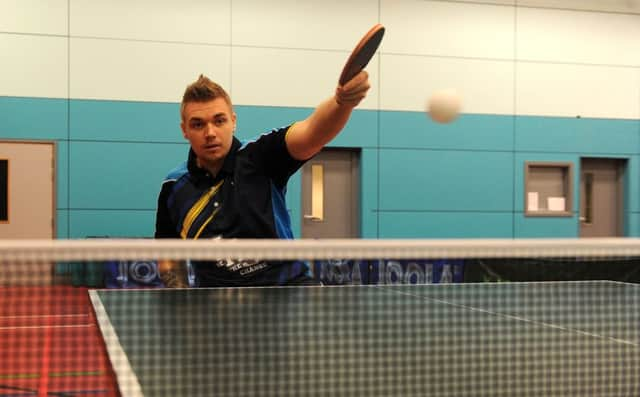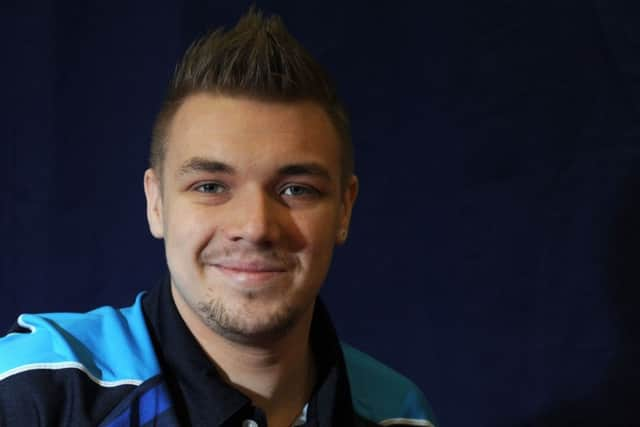Star Interview: '˜I hate the feeling of losing': Sheffield Paralympian Jack Hunter-Spivey on the '˜buzz' of table tennis, dating apps and the need for openness about mental health in sport


“It was something me and my mum sang, she was a fan and always said it to me when I was down,” says the Paralympic table tennis player, wheeling himself to the side of a court at the English Institute of Sport where he trains daily. He’s been giving an impromptu demonstration for the photographer; after gamely accepting a couple of my feeble serves he began merrily thwacking the ball across the room, offering a glimpse of the talent that’s taken him to number seven in the world rankings.
If he’s encountered doubters in the past, they surely must now have been silenced. Jack won a gold medal in the men’s singles at the US Open in Las Vegas late last year, competed in Rio and was back in action at the weekend in the national championships.


Advertisement
Hide AdAdvertisement
Hide AdBut there’s still a great deal he wants to explain about the challenges facing disabled athletes – and the importance of top flight names discussing mental health problems.
Jack, 22, was born with cerebral palsy. He was completely blind and deaf for the first nine months of his life, until both senses returned spontaneously.
“Mum said she was singing in the kitchen and turned round – she attributes her ‘bad singing’ to me getting my hearing back,” he says, by turns funny and fearlessly honest. “Then a week later my sight came. The doctors said I’d never walk, talk, or do anything – that I was a shell of a baby.”
He was brought up on a Liverpool council estate, and his introduction to table tennis came in a local youth club for disabled children when he was 10. “Deprived kids used to get some food and stuff. I was not born in the greatest of areas. But they had table tennis, and I enjoyed playing it.”


Advertisement
Hide AdAdvertisement
Hide AdEnjoyed is perhaps an understatement – he became pretty obsessed, it seems.
“I was hitting the ball up and down at midnight, watching YouTube videos, I was doing my mum’s head in talking about it all the time. At school no-one else liked it, so I was a bit of a weirdo. It was like the table tennis bug.”
He quickly learned the Paralympics were coming to London in 2005, and decided to make a sporting career his goal.
“It opened my mind a bit. Back then I hated using a wheelchair and being different from the other kids. I wanted to be a footballer, all those clichés. I was holding on to the table, clinging to it, and had to sit down between points.”
Advertisement
Hide AdAdvertisement
Hide AdHe started attending a proper table tennis club, but there were difficulties; sometimes money was so tight his mother found the £2.50 admission fee hard to scrape together. “There have been times when she’s sacrificed a loaf of bread because she was the only one who believed in me, that I could do it.”
By 11 he was trying out for the GB development team, and got into the elite performance squad in 2011. He missed out on the London games – “That was really tough, it was my dream” – but experienced the atmosphere through the Inspiration Programme, aimed at those who ‘didn’t quite make it’.
“It set an absolute fire in my belly, watching my teammates play in London, seeing the crowds and realising what it’s like.”
Dark clouds were gathering, though. Aged 18, Jack developed severe depression, and later made the first of several attempts on his life.
Advertisement
Hide AdAdvertisement
Hide Ad“I’ve always felt to different to everyone else and in a bit of a bubble – a bit self-conscious about stuff. It came to a head in training, I had a two-week breakdown where I didn’t really know what was going on, at training I was crying uncontrollably. I don’t really remember this period too well. But my coaches told me I was coming in the same kit, I wasn’t showering. I was fighting against them saying ‘I’m fine, I’ll just do some washing’. In my house I was turning mirrors round. I was so horrible in my own head. Just after that, aged 19 or 20, I tried to take my own life.”
He remembers sitting on the edge of his bed, ‘really scared, shaking’, with a fatal dose of tablets in his hand. “I rang my mum and said ‘I’m sorry, I can’t live like this any more’. Luckily my roommate heard me, came in and took the tablets. I’ve been through some very dark times.”
Jack takes medication, has undergone therapy and feels ‘so much better’. “A lot of professional athletes come out with mental health problems after they’ve retired. Everyone’s open about talking about disabilities, why can’t we talk about mental health in the same way? Statistically one in four struggle with mental health problems in some way.”
He’s seen the effects on others; his mother Renee has bipolar disorder and was sectioned when Jack was younger. He now works with the charity State of Mind Sport. “I’m in a position to help others.”
Advertisement
Hide AdAdvertisement
Hide AdHis efforts are focused on the Tokyo Paralympics in 2020, but he’s a harsh critic of his own abilities. In Rio he missed out on the knockout stages, losing to Brazilian Claudiomiro Segatto who won a vital match 11-8.
“I was going for a medal. I wasn’t down on paper for a medal, but in my head I could beat all the best players in the world. I didn’t achieve what I wanted to achieve. After that I sat down with myself and said ‘Well done for getting in the Paralympics but that’s not what I wanted’.”
What keeps him hooked on table tennis?
“It’s like high speed chess, that’s the only way to explain it. If you win a point, you’re shouting, there’s a lot of psychology involved – there’s everything going on. It’s an absolute buzz to be out there. I hate the feeling of losing. Sometimes I don’t like training too much, in the mornings when it’s seven o’clock and it’s raining, and freezing, and my body’s sore on a Friday – but I’ve got up, because I don’t want that losing feeling again. That’s the edge for me.”
He receives lottery funding of £9,000 a year – “I’m really grateful for that” – and has a kit sponsor, but envies players with greater financial backing.
Advertisement
Hide AdAdvertisement
Hide Ad“I have to buy my own equipment. After everything else I probably have £200 a month, which is really hard. I just need a bit of help. I’d love to have a budget where I could cook fresh food every day, or go to extra training and not have to stress about money all the time. My bat’s probably about £500. The top athletes change their equipment every month.”
He moved to Sheffield four years ago to be near the EIS, and lives in a small flat in Hillsborough.
“Sheffield is full of hills, which isn’t good for wheelchairs, but I love it, it’s an absolutely amazing city. It’s full of students, the nightlife’s amazing and the facilities are good. And people are so friendly as well, I think that’s a northern thing but everyone is very helpful.”
Next month is his 23rd birthday, and he expects to be playing well into his thirties. “Paralympic sport is so professional now. It’s amazing to have household names like Hannah Cockcroft and Jonnie Peacock doing A Question of Sport – all these things Olympians would do.”
‘On Tinder people reject you for being in a wheelchair’
Advertisement
Hide AdAdvertisement
Hide AdJack Hunter-Spivey made the headlines last year when a Facebook post asking whether people would ‘date someone in a wheelchair’ went viral.
Writing in a discussion group, he posed the question: “Honest opinion guys... would you date someone in a wheelchair? And what are your first thoughts of a disabled person when you see them?”
The debate was picked up by national newspapers and he was inundated with messages.
“It was ridiculous. It’s one of those things nobody really talks about. I was always on Tinder, and some people did reject you for being in a chair. I’ve got a girlfriend now, it wasn’t like ‘woe is me’, I’m quite outgoing in clubs. Hundreds of girls were saying how fit I was, that they’d take me on a date. It’s boosted my social media.”
Advertisement
Hide AdAdvertisement
Hide AdJack added a ribald comment to the post confirming he was ‘in full working order’.
“It’s a taboo to talk about sex and girls, because you’re in a wheelchair and you’re put in that pigeonhole of ‘You don’t do that’. I’m a young, 22-year-old lad. It was good to clear the air. But it was a strange old time. I wasn’t begging for attention.”